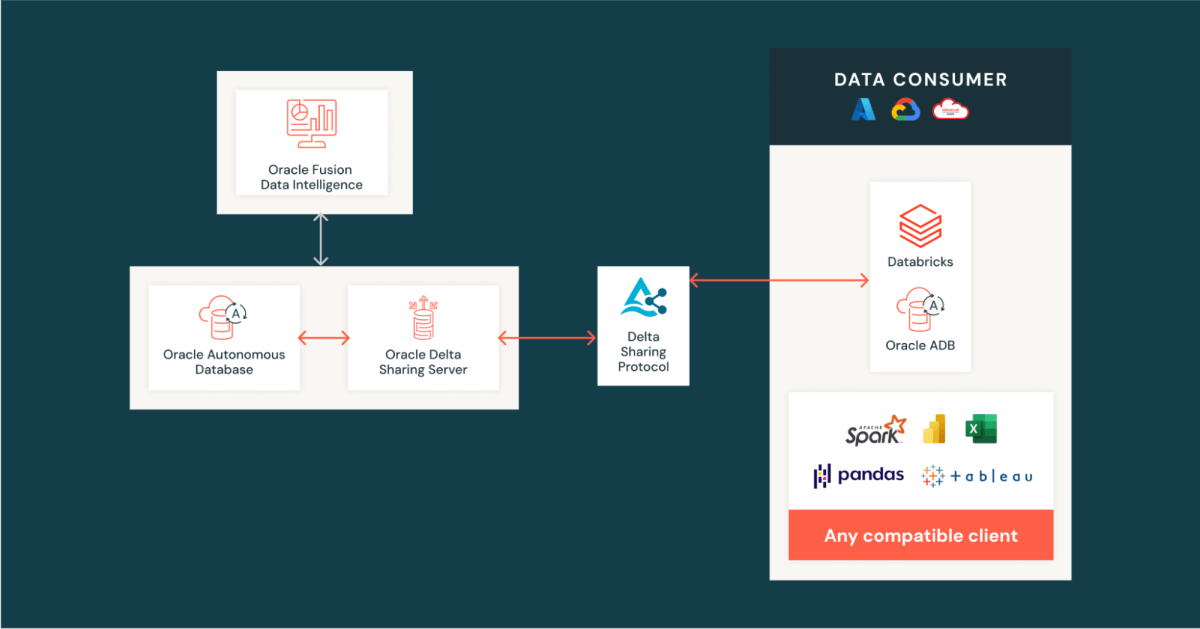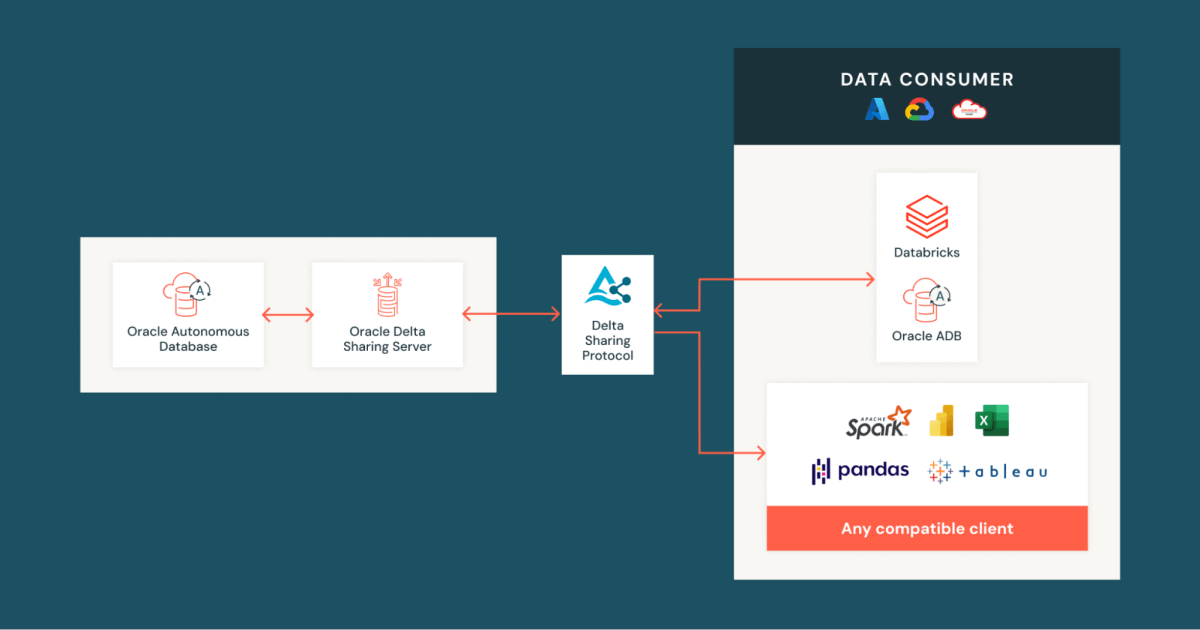Until now, sharing data between business systems often meant complex pipes, duplication and blocking. With Oracle’s support for Delta sharing, this is no longer the case. Oracle Autoomous database – along with Oracle Fusion Intelligence intelligence – can now share data with databricks and other platforms safely and smoothly, all without data copying or govering rules. This blog examines why Oracle has accepted Delta sharing, how it improves cooperation across ecosystems and real -world use for technical teams and business users.
Understanding Oracle Adb and Delta sharing
The Oracle (ADB) autonomous database is a fully managed database without a server created for transaction and analytical workload. It handles automatically providing, scaling and tuning, relaxing teams to focus on creating applications and knowledge, not managing infrastructure. The ADB is designed to provide performance and sponsor that businesses need without operating overhead costs.
Delta sharing, on the other hand, is an open protocol for secure data sharing across clouds, regions and platforms. Instead of duplicating data or settings of their own API, teams can share live data directly, be it internal teams, external partners or customers. Delta sharing, built into the Databricks Unity catalog, also ensures that shared data remain safe, controlled and easy to discover for scientists and analysts. It is a fully managed database without a server that provides slot machines, scaling and debugging for both transaction and analytical workload. It is designed to simplify data management while providing high performance for enterprise applications.
Why did Oracle choose Delta sharing?
Oracle Autonomous Database customers increasingly need to share data with partners, suppliers or analytical platforms – quickly, safely and without data forces. Take the manufacturing company using Oracle ADB to manage the product data cycle: may have to provide suppliers in real time. Now the retailer can store transaction data in ADB in databricks for advanced analytical and machine learning.
Historically, these types of data exchanges were reduced by outdated methods such as FTP, E -mail or ETL pipeline. Although these approaches are known, data has often duplicated, added storage costs and delayed findings. Worse, they were not designed for real -time approach, which caused cooperation clumsy and inconsistent.
Oracle wanted a better way – Oone, which was in line with the focus on openness and customer selection. Many modern data sharing solutions felt more popular ecosystems and blocked customers in access specific to the supplier. Delta’s sharing offered a clear alternative: an open protocol of Agnostic Cloud, which is designed to distribute these walls.
Here’s the reason why Delta’s sharing excelled:
- Receiving open and more cloud cooperation
Many organizations operate in multiple environments and use Oracle ADB along with platforms such as databricks or tools on clouds such as Osa, Azure or GCP. Delta sharing allows data sharing on these data controlled platforms without the complexity and replication of data. - Supporting tools for business news
Business teams rely on tools such as Power Bi and Tableau to get data from data. Previously, the interconnection of these Oracle Adb tools meant building and maintaining their own connectors – the process of consuming time. Delta sharing this simplifies this with BI assembly support, so teams can safely analyze shared data with minimal settings. - Exceeds Adb
It’s not just an autonomous database. Oracle’s Fusion Data Intelligence runs on Adb. With Delta sharing, users can share operating data directly from the Oracle Fusion Intelligence Intelligence Intelligence without editing or duplication of data. For example, a healthcare provider can send data on patients from Oracle Fusion Intelligence Data Intelligence to Databricks for Clinical Studies controlled or to a table for clinical panels for and in real time.
As Oracle Adb and Delta work together
Oracle ADB BI-DELTA Sharing Bin-Delta-Meaning Sharing This can act as data and data provider. AdB customers can share data with databricks users or any platform that supports the sharing of the DELTA open protocol, and has access to data from this system, all without duplicating or moving data manually.

Here are 4 scenarios of data sharing that this integration supports:
| # | Trade | Data sharing scenario |
|---|---|---|
| 1 | Power Ml Models with Adb Data | Adb → databricks |
| 2 | Enrich Oracle Adb and Saas with AI Insights | Databricks → adb |
| 3 | You work safely with external partners for business/dashboard | Adb → Power Bi/Table |
| 4 | Centralize data sources to ADB | Other platforms → adb |
Let’s take a look at data sharing from Adb on databricks.
Sharing from Oracle Adb on databricks
ADB users can share operating or transaction data sets with databricks to allow advanced analytical and ml working procedures. This is done safely through Delta Oracle sharing server, which allows access to data files without physical transfer of data.
- Create sharing – The AdB administrator defines a data file and creates data sharing.
- Grant access – The container feels a secure activation e -mail with a download file for download (JSON).
- Ask for access – The container used the login data to verify and request data.
- Safely access to data -Server DELTA sharing verifies the request and returns a preliminary request (by)-a short, secure URL directed to parquet files in storing objects.
- Designed for performance – Becuse data is read directly from storage of objects, the database server is not burdened with other performance requirements.
This approach keeps things fast, safe and scalable.
Here is a demo that shows how to create a share in Oracle and consume that they share databricks
For the rest of the scenarios, Fer here in Oracle documentation.
KPMG: Delta sharing eliminates the silo and accelerates financial reconciliation
KPMG helps to unify financial records of the main data and transactions across Oracle ADB and Databricks using Delta sharing, eliminating the transfer of data about Reduant and older integration formulas. The large national retailer cooperates with KPMG to modernize its financial reconciliation processes. Historically, the financial data and transactions of the retailer were locked in the data warehouse, while the reconciliation and reporting concerned the launch of BI tools and its own integration, which led to delay and incontency.
With this new integration, curatorial financial data sets and transaction display are securely exposed from Oracle ADB directly to BI tools and platforms to agree to purchase by sharing Delta. Its native connectors to power BI, tables and other analytical platforms allow financial analyzes to access verified data in real time for reconciliation-and the need for extraction or data replication. For this reason, this is close to simplifying architecture by removing older connection patterns, reducing overhead costs and ensuring a single source of truth for financial reporting and analysis.
“Oracle and Databricks are important alliance partners in our partner ecosystem,” notes Michael Juarez, manager of Advisory Enterprise Analytics in KPMG. “Delta sharing eliminates the silo between databases, allows rapid implementation, native monitoring and traceability and trouble -free integration with BI third -party tools.”
Journey forward: Expanding partnership
Partnership between Oracle and Databricks continues to evolve with several exciting development on the horizon:
- Change data source support – Oracle Adb will soon support data change, allowing customers to share only changed data. This will reduce unnecessary data movement and reduce processing costs.
- A non -fueled support table – Customers will soon be able to use Apache Iceberg ™ tables to share data. Iceberg is a modern table format that time travel supports, scheme development and high -performance questions, ideal for sharing large dynamic data sets.
- Improved verification -The users of Adb Oracle can now authenticate to databricks using their identity provider’s login data (IDP) before relying on the OAuth token issued by the provider. This simplifies access management and strengthens the security contribution on both platforms.
Are you ready to experience the power of Delta sharing between Oracle Autonomous Database and Databricks? Watch this video to find out how Oracle has accepted the delta sharing. Take a look at the Oracle Live Labs, where you will find instructions for stepchiefs to set the delta sharing between platforms.
Do not miss Summit Data + AI in San Francisco (Moscone Center, 9 – 12 June)! Sign up and check out the product and engineering team discuss the latest innovations in sessions as “what’s new with data sharing and working with live demis” and “Delta sharing in action: architecture and proven procedures”

